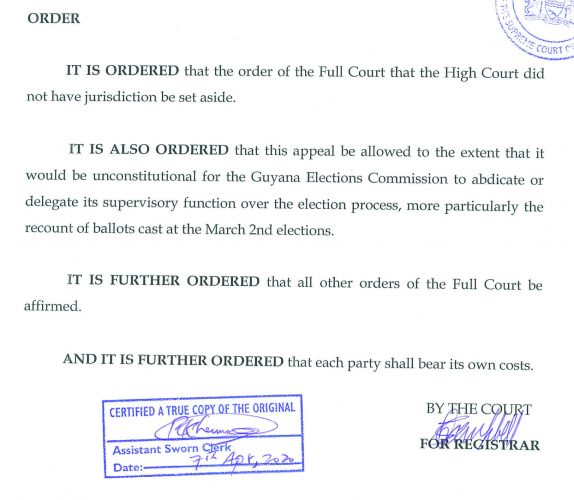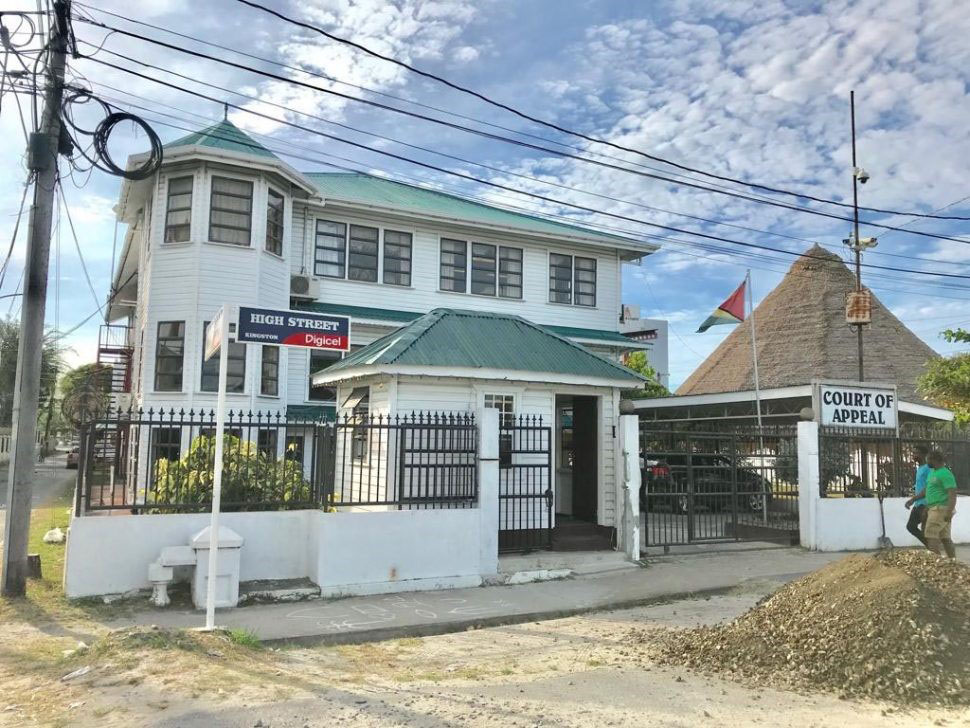In orders issued yesterday afternoon, the Guyana Court of Appeal reiterated that while the Guyana Elections Commission (GECOM) can proceed with a recount of the ballots cast in the March 2nd general and regional elections, it cannot abdicate or delegate its supervisory function over the election process, more particularly the recount of the ballots.
In a two-to-one decision, the Appeal Court on Sunday allowed a sliver of APNU+AFC candidate Ulita Moore’s appeal and ruled that GECOM has the authority to do a recount of ballots but cannot accord this power to any other body as appeared to have been suggested in a GECOM press release which said that a Caribbean Community (CARICOM) team would “supervise” the recount.
The appellate court also reduced into an order its finding setting aside an order of the Full Court that the High Court did not have jurisdiction to hear the matter. Justice Franklyn Holder had previously granted Moore injunctions halting the planned recount.
 While a portion of Moore’s appeal was allowed, President of the Court of Appeal panel, Justice Dawn Gregory ruled that the matter would not be remitted to Justice Holder’s court since the Appeal Court had already examined the case.
While a portion of Moore’s appeal was allowed, President of the Court of Appeal panel, Justice Dawn Gregory ruled that the matter would not be remitted to Justice Holder’s court since the Appeal Court had already examined the case.
The Full Court comprising acting Chief Justice Roxane George-Wiltshire and Justice Nareshwar Harnanan had dismissed Moore’s case and discharged the injunction against the recount on a finding that her matter ought to have come by way of an elections petition and not judicial review as it had been filed before Justice Holder.
They ruled that Justice Holder therefore had no jurisdiction to hear the case as he had given himself.
The appellate court, however, affirmed all other orders of the Full Court the key one being that the injunction against a recount had been discharged.
In a comment to Stabroek News yesterday after the orders were issued, Roysdale Forde, one of Moore’s attorneys, describ-ed the Court of Appeal’s decision as a very historic one, which he said defined the limits and depth of the powers of the elections commission.
Regarding the calls by some for CARICOM to validate the process, Forde said that having regard to the appeal court’s ruling, it is GECOM which has control of the entire process, so that it cannot delegate that validating responsibility to any other body.
According to him, clearly the appellate court has rejected attorney Anil Nandlall’s position that the CARICOM agreement was valid or constitutional.
Declaring that Nandlall has “lost the case,” Forde opined that he (Nandlall) may likely be appealing to the Caribbean Court of Justice (CCJ).
He noted, too, that the Court of Appeal’s ruling affirmed Justice Holder having jurisdiction to hear his client’s case, which she had always maintained.
Yesterday, Nandlall, however, pointed out that the court did not add anything new to its ruling delivered on Sunday.
In a brief comment he told this newspaper that Forde’s application to the court for consequential orders, were refused.
Nandlall represents Opposition Leader Bharrat Jagdeo whose position it was that Justice Holder had no jurisdiction to hear Moore’s case.
Also making comments was another legal mind who requested not to be named. That person is of the view that statements made by Prime Minister of Trinidad & Tobago Dr. Keith Rowley regarding the current electoral state of affairs in Guyana “is disrespectful.”
The lawyer said that given the Guyana Court of Appeal’s finding on the powers conferred to GECOM in relation to the role CARICOM was set to play, Rowley’s comments “seem to be out of place and designed to undermine the integrity of the decision of the final court in Guyana.”
“It is disrespectful,” the attorney said.
In the Sunday April 5th edition of the Stabroek News, Rowley expressed disappointment and concern at the ongoing delay in executing a credible tabulation of the votes cast in Guyana’s March 2nd general and regional elections.
“I am getting a feeling that this is not going to end well…I hope I am wrong but that feeling…I am not having a good feeling…I have this unsettling feeling [that grows] with every passing day,” he said last Friday.
Speaking in an interview with journalist Elizabeth Williams, Rowley said he was deeply concerned and worried that a month after polling, the elections have become a “court house matter” and Caribbean Community (CARICOM) leaders, who sought to assist by sharing the benefit of their experience and the comfort of their presence, have been vilified.
While Justice of Appeal Gregory and Justice Brassington Reynolds partially allowed Moore’s appeal, Justice of Appeal Rishi Persaud ruled against and instead fully agreed with the Full Court’s decision that Justice Holder had no jurisdiction to hear Moore’s matter.
In allowing the appeal on a slim basis on the issue of jurisdiction, Justice Gregory said the jurisdiction of the High Court is a narrow one and it was invoked by the description of the authority of the CARICOM team relative to the constitutional powers of GECOM.
She stressed that the court grants the order that any agreement in which supervision of the election is removed from GECOM and ascribed to anybody else, will be unlawful.
Justice Reynolds noted that GECOM’s primary mission, set out in articles 62 and 162 of the Constitution, is to conduct the electoral process. He noted that the operational phases of the elections are detailed very minutely in provisions of the Representation of the People Act and are a virtual road map for the entire electoral process.
“…it is my respectful view that it will be remiss of the court to expect the appellant to await the outcome of an elections petition to redress this issue. It is my respectful opinion that this development having been brought to the attention of the court, while being actively concerned wholly outside of the scope of the commission’s constitutional remit, warranted the intervention of the court in its supervisory constitutional jurisdiction,” the judge said.
He said that the court, in its supervisory jurisdiction, is in a position to say to GECOM that it should not outsource its supervisory responsibility in terms that are outside the scope of its constitutional remit. For that reason, and others, which he said were more fully detailed in Justice Gregory’s judgment, he was in agreement with her findings and the order she makes.
Meanwhile, dismissing Moore’s appeal, Justice Persaud said that having regard to all the circumstances of the case, including its national importance, he could not fault the ruling made by the Full Court judges.
Moore had applied to the High Court for judicial review by way of an application in which she contended that GECOM could not order a recount based on an Aide Memoire signed by President David Granger and Opposition Leader Bharrat Jagdeo.
President Granger had contacted CARICOM Chair, Prime Minister of Barbados Mia Mottley, and agreed for a recount to be done following controversy over the tabulation of the votes cast for Region Four, which opposition parties as well as international and many local observers say was not done in a transparent and credible manner.
Following the president’s request, Prime Minister Mottley had put together what she described as an independent high-level CARICOM team, which traveled to Guyana to supervise the recount. This was, however, aborted after Moore filed her application and was granted the injunction against the recount.
The opposition PPP/C’s position has been that Returning Officer (RO) for Electoral District Four, Clairmont Mingo did not, as required by law, use the statements of poll (SOPs) to tabulate the results he eventually declared.
In an affidavit dated March 20th, GECOM Chairperson retired Justice Claudette Singh had given an undertaking following a ruling delivered by Justice George-Wiltshire that should there be discrepancies in the SOPs called by Mingo with those held by political parties, then such discrepancies would be noted at the end of the process if they could not be addressed then, and she would endeavour to facilitate a recount at the level of the Commission.
GECOM has since voted for the recount to take place in each of the 10 electoral districts beginning chronologically with Region One. A plan for this is to be presented today by the Chief Election Officer, Keith Lowenfield.
The Private Sector Commission has, however, called for only the votes of Region Four to be recounted as it is only those which are in controversy.






